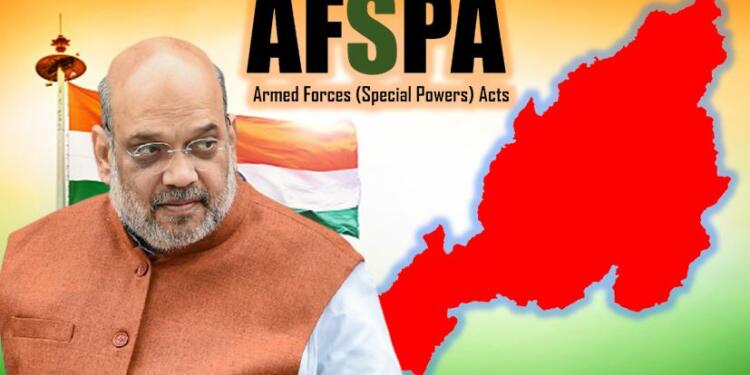Prior to the 2019 Lok Sabha elections, one promise that the Congress party made in its manifesto was this: “The Armed Forces (Special Powers) Act (AFSPA) and the Disturbed Areas Act in the state will be reviewed and suitable changes will be made to balance the requirement of the security and protection of Human Rights.” The Congress manifesto also promised to “Review the deployment of Armed Forces, move more troops to the border to stop infiltration completely, reduce the presence of the Army and CAPFs in the Kashmir Valley, and entrust more responsibility to the J&K police for maintaining law and order.” The Congress party suffered a humiliating loss in the 2019 elections.
Also read: BJP fulfills campaign promise, withdraws AFSPA completely from Meghalaya, partly from Arunachal
The BJP, under the leadership of Prime Minister Narendra Modi, formed the government once again with 303 Lok Sabha seats. You would have thought that with the defeat of the Congress, AFSPA (Armed Forces (Special Powers) Act) will remain untouched in states like Nagaland and Jammu and Kashmir, right? Well, the Ministry of Home Affairs seems to have other plans — none of which are in India’s interest.
Panel set up to ‘review’ AFSPA applicability in Nagaland
In an order dated December 26, the Ministry of Home Affairs (northeast India division) said, “In order to review AFSPA in Nagaland a committee is constituted.” The decision was taken after Union Home Minister Amit Shah chaired a meeting to discuss the present scenario in Nagaland on December 23 in Delhi. The committee will give its inputs to the Union Ministry within three months.
Also read: AFSPA could be removed from Manipur and it could happen very soon
The seven-member committee is headed by Dr Vivek Joshi, Registrar General & Census Commissioner, India, while J Alam, chief secretary of Nagaland is a member. Director General of Assam Rifles Lt Gen PC Nair, DGP Nagaland T John Longkumer, Dr MS Tuli, who is the joint director of Intelligence Bureau are also its members. The mandate of the committee is simple — review the application of AFSPA in Nagaland.
MHA has set the ball rolling down a slippery slope
What does the Home Ministry think this committee will recommend? And if it recommends the removal of AFSPA from Nagaland, will the Government of India be foolish enough to comply? Will it be willing to let Nagaland spiral into yet another bout of extreme militant control while the armed forces get caught up figuring their way out of repeated bureaucratic and local law enforcement dust-ups?
Also read: Don’t blame the army, blame the politics for the Nagaland mess
The Indian Army is a convenient target. People know they can speak against it and expect no repercussions. Would AFSPA opponents question Naga insurgents and tell them to surrender for the larger good of the state? They won’t. Because they will be hunted down if they do. By demanding a repeal of AFSPA, the conflict in Nagaland is being trivialised by vested interest groups. They want you to believe AFSPA is what is killing people, when in fact, AFSPA is why relative peace is being maintained. They want to make the Army toothless.
The Indian Army is a convenient target. People know they can speak against it and expect no repercussions.
Would AFSPA opponents question Naga insurgents and tell them to surrender for the larger good of the state? They won't. Because they will be hunted down if they do.
— Sanbeer Singh Ranhotra (@SSanbeer) December 6, 2021
What happened in Nagaland is horrible and should have never happened. But to demand a repeal of AFSPA without solving the underlying fundamental problem of insurgency and secessionism, to my mind, is infantile and an indicator of a nefarious agenda.
— Sanbeer Singh Ranhotra (@SSanbeer) December 6, 2021
Unfortunately, the Home Ministry is succumbing to their pressure. The review panel is the first step towards the removal of AFSPA from the state of Nagaland. The government has set a dangerous ball rolling in northeast India, whose repercussions will be felt in Jammu and Kashmir as well.
Will the Government of India be able to handle the heat?
The decision of MHA to begin talks regarding AFSPA’s application in Nagaland will have trickle-down effects all-over northeast India. All northeastern states, irrespective of whether they have been able to tame local insurgencies, will demand a repeal of AFSPA. With the powers of the army and other forces curbed, insurgent groups will regroup and capitalise on their existing resources and manpower. The army will not be able to carry out extensive and immediate operations in disturbed and militant-infested areas.
Is the Government of India planning to let insurgent groups gain the upper hand after decades? Unquantifiable resources have been spent to bring about relative peace in this region of India, which is under the constant watch of China.
Also read: PM Modi’s views on AFSPA – Super bold and very logical
And then, how will the government respond to calls of repealing AFSPA from Kashmir? Already, demands are being raised to the same effect. Will the government set up panels for reviewing applicability of AFSPA in Kashmir as well?
There are many questions which the Ministry of Home Affairs has given rise to with one unsound decision. It would be in the best interest of India if the panel is disbanded and the army is allowed to exterminate insurgents from Nagaland. The northeast needs peace, which will be ensured only if the army is able to act on its own accord. With AFSPA gone, a truckload of problems will descend over not only the government, but the country as a whole.
























